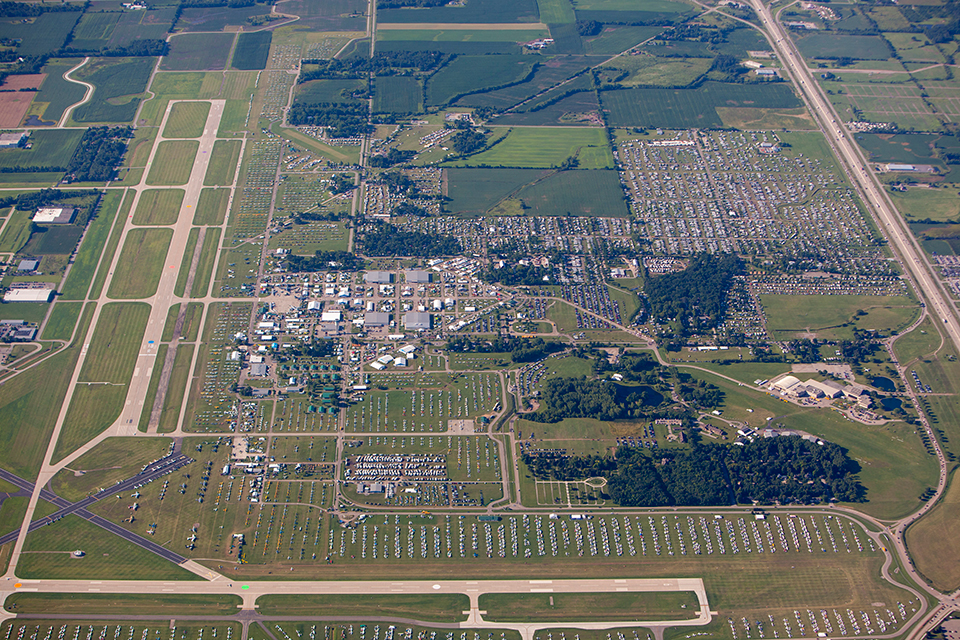10 Tips for Flying in to AirVenture
Flying yourself into EAA AirVenture Oshkosh is a rite of passage for some pilots, a bucket list item for many others, and an annual must-do for still others. Whichever category you’re in, arriving at Oshkosh is only difficult if you’re not prepared. Here are ten tips to make sure you’re ready when the time comes.
Read the NOTAM
If the headline for this story was “One Tip for Flying in to AirVenture,”,this would be it. Some NOTAMS are one or two sentences — ours is 32 pages, and it’s an absolutely mandatory read before you fly in. Wittman Field in Oshkosh becomes the busiest airport in the world during the week of AirVenture, and that only works because people follow the rules in the NOTAM. It’s available as a download or you can order a printed copy and we’ll send it to you for free, as long as you promise to read it.
Arrive Before You Get Here
If you have a PC-based simulator like Microsoft Flight Simulator X (currently available from Dovetail Games via the Steam marketplace) or X-Plane, you can fly the Fisk arrival, or any of the others, for that matter, before you leave the house. Enhanced scenery packages are available for both platforms, but even out of the box, you’ll see important landmarks and can get familiar with the routes. You’ll occasionally find prepackaged scenarios, especially on simulators from a company like RedBird, which run on a variant of Microsoft Flight Simulator, that include custom ATC and traffic, but using the simulator is more about landmarks and time and distance than it is about what you hear on the radio. If you don’t have a sim at home, you can do much the same thing on a platform like Google Earth.
Learn the Language
Once the AirVenture NOTAM goes into effect the Friday before opening day, you can listen in on arrivals and departures, and even the air show air boss, from anywhere in the world via LiveATC. LiveATC also has some archives available, which, while dated, can still give you a feel for what you’ll hear when you get here. YouTube is another great source for ATC audio, with examples like this and this, among hundreds. There are even some unfortunately spectacular examples of what not to do.
Watch Somebody Else Do It
You can hop in the right seat with one of our volunteer pilots and the NOTAM chairman Fred Stadler and take a detailed look at each step of the traditional VFR arrivals as well as a typical VFR departure in this five-part video series. And, once again, YouTube is also a great place to get a pilot’s eye view of the arrival procedure, which can go a long way to letting you know what to expect. You can watch some examples like this or this, or you can just head to YouTube directly and search for terms like “Oshkosh arrival.”
Go to School
Every year, we present a live webinar that steps you through the AirVenture arrival procedures. These presentations last about an hour, and include time for questions and answers. If you missed the live presentation of this year’s webinar, you can still watch the archived version as many times as you like.
Know Your Numbers
This seems like common sense, but you might be surprised. When you arrive at Ripon, the procedure in the NOTAM mandates that you fly at 1,800 feet at a speed of 90 knots (or 2,300 feet and 135 knots for faster aircraft.) This doesn’t mean 85 knots or 97 knots — it means 90. Know your power settings so that, when the time comes, you can nail your speeds.
Hit the Dot
Here’s another one from the common sense file: If your spot — or, in our case, dot — landing skills aren’t up to par, go out and practice. If you need to, get a little extra dual instruction. When you’re cleared to land on a given dot, our procedures only work if you do just that. Landing short or floating and touching down a couple of hundred feet past the dot can cause all kinds of separation problems.
Bring a Friend
Just make sure it’s the right kind of friend, the kind you trust to help provide you with an extra set of eyes and ears to watch for traffic, listen to ATC, etc. The kind of friend who’s flown in to AirVenture before is a bonus. If you bring the kind of friend who’s loud and distracting, brief them thoroughly and firmly before you leave so that they know when it’s time to be quiet.
Check on Parking
While we’re always committed to accommodating all of our visitors, sometimes being the busiest airport in the world can mean some temporary parking delays. You can check our parking status and get other updates on field conditions here.
Tie a Knot
If your airplane is hangared full time, you might be a little out of practice when it comes to using tie downs. Take a minute to practice, and, while you’re at it, check out your tie downs themselves. If they don’t look like they’re up to the task, you can build your own. Find instructions, as well as some tips on knots, rope types, and all other things tie-down-related here.
Save Money Along the Way
FBOs and airport managers all across the U.S. offer everything from free snacks and discounted ramp fees to courtesy cars and fuel discounts to pilots heading to AirVenture. Before you set off for Oshkosh, check out our list of special offers that might be available along your route.

